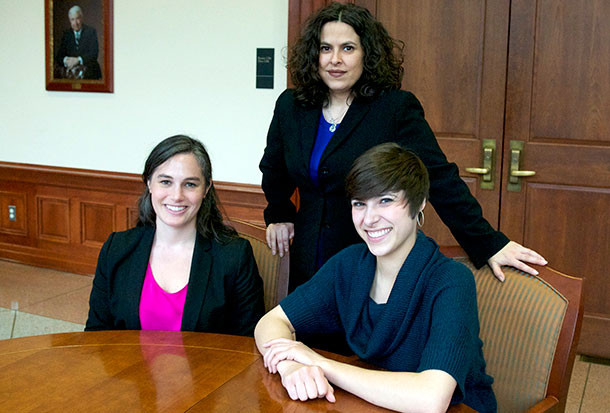
Children’s Rights Clinic jury trial team (from left to right): student attorney Brooke Ginsburg, ’14, supervising attorney Leslie Strauch and student attorney Rebeca Ojeda, ’15.
The Children’s Rights Clinic doesn’t try jury cases every year, which makes the two consecutive cases unusual. Most of the clinic’s cases resolve in mediation or are decided in a bench trial, said Leslie Strauch, a clinical professor and supervising attorney with the Children’s Rights Clinic. Texas is also one of the few states that allows a jury trial in family law cases.
In the first trial, Child Protective Services sought termination of parental rights for child maltreatment. Rebeca Ojeda, a 3L and advanced clinic student, was second chair to Strauch. Ojeda participated from start to finish, doing both direct and cross-examination of several witnesses, including an expert witness. The jury returned a 10-2 verdict in favor of terminating parental rights — the position advocated by Ojeda and Strauch.
“The entire jury trial experience was unique and unforgettable,” Ojeda said. “Having the opportunity to direct and cross examine witnesses, assist with jury voir dire and follow the legal musings of the judge has definitely seduced me into pursuing a career as a litigator.”
Brooke Ginsburg, also a 3L, participated from start to finish as second chair to Strauch in the second trial. The case was similar in that Child Protective Services was seeking termination of parental rights. The clinic agreed and advocated that stance at the trial on behalf of the child. Ginsburg prepared the trial notebook and examined the witnesses.
“The trial put into perspective the importance of each action an attorney takes throughout the life of a case,” Ginsburg said. “It was a tremendous learning experience to be part of a jury trial from start to finish. I learned a lot about making arguments and procedural law, but I was most excited to see that with hard work, strategic thinking and preparation an attorney can positively impact a child’s life.”
Ojeda echoed the sentiments of her fellow clinic student: “These cases are difficult, but after seeing the grins of our clients as they nestle into the arms of their future-adoptive parents, I know we advocated for justice. And won.”
In the first case, the foster parents plan to adopt, and in the second, case family members plan to adopt.
“I really enjoy my job and I enjoy it even more when I have a student who gets to have an experience like a jury trial. I think it’s invaluable,” Strauch said. “Even if these two students never go into child welfare, it will be a useful and great experience for them.”
— Samantha Youngblood
